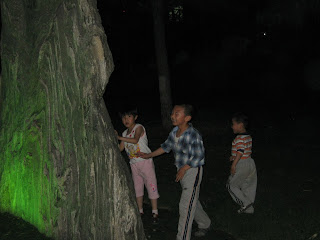I think the quarantine debacle upset our hosts as much as it did the Americans. There were government guidelines which had to be followed. According to the international office, the rules were based on World Health Organization (WHO) guidelines. From the beginning, International Office staff doubted that Nicole had the flu, but the rules were clear. A concern was whether the student from Southern Polytechnic would go to the hospital and be exposed to patients who actually did have the flu. Turned out she was the only patient in the isolation wing of the hospital.
The day afterwards, they treated us all like children who have been through an ordeal, putting us all in a bus, feeding us burgers and fries from the Chinese McDonald's, and taking us to see the National Chinese Acrobats.

Chinese acrobatics is an ancient art, more like ballet than circus performance. A slack wire is used rather than a tight one. Performers accomplish amazing feats such as piling on top of a bicycle fourteen at a time in flower formation. The acrobats are all very young; they train from early childhood. This is a career, and like ballet, it is an extremely short one.


If you'd like to read about the Chinese acrobats, here's a link to a wonderful educational pamphlet about them with great pictures:
http://cpinfo.berkeley.edu/information/education/pdf_files/2008/National_Acrobats_of_China_Study_Guide_0809.pdf













